- Home
- Charles L. Grant
Jackals Page 5
Jackals Read online
Page 5
She clearly wanted to argue, pride evidently not wanting to let him know just how bad she felt and how badly she needed the rest; but she agreed, yawned and laughed, and disappeared into the bedroom. As soon as he was sure she had settled down, he went to the living room, opened the liquor cabinet, and moved two bottles of brandy to one side. Then he slid a panel aside and took out a cloth bundle. He unwrapped it and hefted the exposed .38 in his hand. Loaded it. Tucked it into his belt, pulled his shirt out all around, put on a pair of sunglasses, and went outside.
The car was hot and stifling, the interior almost too hot to touch, and he cursed forgetting to roll down the windows. He considered driving back to the interstate, to a place he knew where he could watch the traffic without the traffic watching him, or to see if Jonelle and Peter had noticed anything, but he was afraid the engine’s noise, never gentle at the best of times, would wake Rachel up.
So he walked instead, two miles south, the way she’d first come to him.
He didn’t really expect to find anything, and he didn’t, and became angry at the disappointment that flirted at the edges of his relief.
Back at the house, he showered, dressed, and waited in the living room.
Watching the sun go down.
Watching the field across the road.
Starting when she came into the room, smiling, declaring she was starved and if he didn’t keep his promise, she’d eat everything in the cupboards.
“Not,” she added wryly, “that I care all that much for chicken soup.”
A quick hand over his face told him he needed a shave, and while he did, she leaned against the bathroom jamb, listening as he reckoned aloud she might even be able to get home in the morning. He gave her her choice of airports. Although he didn’t believe she would have trouble getting the flight she wanted from Tri-City, he felt she’d be pleased to know there would be plenty of backup over in Knoxville, just in case. The offer to supply her with the ticket was accepted without question or condition; a further offer of a little cash for minor expenses was also accepted without her protesting at all.
“Just don’t expect me to be able to pay you back soon,” she said on their way to the front door.
He smiled. “Your company, dear lady, is all the payment I expect.”
She looked up at him and grinned. “Bullshit.”
“Absolutely.”
“You’re really rich?”
“Disgusting.”
“Maybe I won’t pay you back at all.”
But she would. This woman, like only a few others he had met who knew him and what he was, wouldn’t accept an obligation unless she could meet it fairly.
With a wink, then, she pushed him aside and opened the door.
“Son of a bitch,” she said, “it’s hot out here!”
The telephone rang.
It could have been any number of people, calling this time of day—Maurice, Jonelle, a dozen others, but he had a bad feeling it wasn’t. Charlie Acres hadn’t arrived, and even if he’d been crawling, it wasn’t that far from there to here. He should have been here by dawn, shortly after, if he was coming at all.
The telephone rang.
He closed his eyes briefly, a futile attempt to ignore it and dispel the feeling; he had even gone so far as to start to shut the door, but Rachel’s quizzical look asked him if he was going to answer.
With a sigh he tossed her the car keys. “Start her up, okay? Get the air conditioner working. It’s going to be a bitch in there.”
She caught them, squeezed them, yet he felt her watching as he hurried back in, leaving the door open, and grabbed the receiver, standing in the window.
It didn’t take very long—a state trooper out of Chattanooga had found Charlie’s body on the shoulder of I-75, three miles beyond Lookout Mountain just after sunrise. The man calling was polite, very official, but Jim could hear the tremor and knew it was bad. Acres had Jim’s name in his wallet as next of kin, hence the call and the questions, none of them accusatory, none out of line.
“Thank you,” he said flatly when the man was done. “I’ll take care of it.”
He didn’t remember hanging up, didn’t hear Rachel return to the house.
It was bright out there, sunglasses bright, bright enough to bring a few salty tears to a man’s eyes.
And the heat made it hard to breathe.
And the birds heading home to roost for the night made it hard to think.
And the sun was no furnace like the furnace in his head, roaring a flame-wind hurricane that deafened him for a moment, seeing Charlie and his scrawny hound in the front yard right out there by the fence, wrestling as if they were father and son, yelping at each other when each of them was younger; seeing Charlie outside Tucson a handful of years ago on his small, isolated ranch, riding a near white mare, pointing out the dozens, maybe hundreds of different cactuses that grew in the desert and laughing when a root that was a snake had made Jim yelp and twist so hard he nearly fell from the saddle; seeing Charlie at the Tennessee State Fair only last year, watching the girls watching him and shaking his head slowly because none that he wanted would want him if they knew.
Seeing Charlie and his shotgun.
Seeing the fire.
Seeing the bodies fall.
“Bad news?”
He swallowed, and nodded, and swallowed again and said, “Look, would you mind putting off going for a bit? There’s some things I have to do.” He looked at her then. “A friend is dead. I have to do … things.”
He could see she wanted to be sorry, and probably was in an abstract, he-was-a-stranger-to-me way.
While she waited on the porch—her choice, not his—he called the Chattanooga morgue and after arguing with several clerks and huffy bureaucrats arranged for Charlie’s body to be brought to Potar Junction, once the police were finished. Arizona was home, but Charlie had no real family, and this was about as home as the fool would have gotten had he been able to have one. There were more questions, and a firmly polite refusal to drive down there himself
He knew what Charlie looked like now, and it wouldn’t fit the memory he expected to carry.
Charlie Acres would be partly skinned, and parts of him would be missing.
He called Rye Harden in town, told the undertaker what to expect, and where to send the bills. He barely tolerated the professional commiseration, and the none-too-subtle probing not at all.
“Just do it, Rye,” and gave the man official names and dates given to him by the police. When he hung up, he couldn’t release the receiver, knuckles white, wrist quivering.
The hurricane blew.
Jesus, Charlie, Jesus, he thought as his fingers finally relaxed and, just for a moment, he pressed his forehead against the pane.
Then he was on the porch, taking the keys from Rachel’s outstretched hand.
“You know,” she said hesitantly, “I … I can always stay here, make myself something. It would keep me out of your hair. This, uh … I’m sorry about your friend. You probably want to be … you know.”
He appreciated it, the words and the sentiment, and told her so.
Suddenly he sagged against the railing, gripped it in both hands, and lowered his head, closed his eyes. All energy was gone in a rush that surprised and unnerved him. It wasn’t that something like this hadn’t been expected; it happened all the time. But it wasn’t supposed to happen to him and Charlie.
Cowboys and injuns, the man had once said; Think if it as cowboys and injuns, If it’ll make you feel better.
Neither had reminded the other that the Indians sometimes won.
Gentle pressure on his back he recognized as her hand, and he took in the soft and hot, late afternoon air, first in gulps, then in sighs, until he was able to straighten and blink the sun from his eyes.
“Point of fact,” he said, turning, feeling her hand glide around his waist until it fell away, “I could use some company about now. If you don’t mind, that is.”
“No, i
t’s okay.” Then her stomach gurgled, and her hand clamped over it. “Cost you that meal, though.”
“You got it.”
Into the car then, the windows down with the air conditioning blowing, and after backing out of the drive they headed north toward the tunnel of old trees.
“Where are we going?”
He drove with one hand; he didn’t drive fast.
“A roadhouse up this way, just this side of the Junction. Good food. Clog your arteries. You’ll love it.” He didn’t wear sunglasses, though the light was strong, and when he glanced at her he was squinting.
She didn’t look back; she stared out the window, her left hand tracing patterns on her thigh.
Cattle lumbered in pastures, a clutch of wood beehives were shaded by a jutting fist of stone, a pair of buckskins chased each other across a rocky creek. And the horizon in every direction was sliced by mountains touched with haze.
Over a rise five slow curving miles from the house, gnarled, spotted-bark trees hovered at the shoulder for nearly half a mile, their high, overlacing boughs making it darker than he wanted it to be.
Once out the other side they exchanged tense smiles, and she asked him about Charlie, who he was, how he’d died. He almost didn’t answer right away, not sure he could, finally told her Acres was a friend of long standing who had been killed by a drunk driver, hit-and-run, despite repeated warnings to stop hitchhiking at night.
“But he always did, the stupid bastard. Said it was the only way to travel.”
“And it finally … killed him?”
“The dope.”
He felt her stare and knew he’d made a mistake when he turned his head and saw her.
Those damn eyes had changed again, and it was there: you’re lying.
How? he wondered; what did I say?
He lifted his foot from the accelerator and let the car drift toward the left shoulder. When he finally braked, they were midway along a whitewashed picket fence that marked a good fifteen acres of closely mown, rolling lawn touched with fruit trees and flowers. Three-quarters of the way back, on a low knoll at the foot of a paved drive, was an antebellum mansion tucked into a high-crowned stand of century oak. Down the road next to a counterbalanced gate was a scrolled sign hanging from black chains between two brass posts, but at the angle and the distance, he knew she couldn’t read it.
She was confused. “This isn’t … the roadhouse?”
He laughed softly. “Nope.”
“Then why did we stop?”
He inhaled slowly, kept his right hand on the steering wheel, and used his left to gesture out the window.
“When I first came down here, about sixteen, seventeen years ago, I had this stupid idea of what it was supposed to be like to have … I don’t know … money. I’d pretty much scrabbled for it most of my life, and I had built up a ton of notions about what rich people should have, the way they should behave, what they should wear, crap like that. So I built that place over there, Master of the Plantation.
“I had visions, by God. Lord, did I have visions.
“But since there was only me, you can see the place is too damn big, and I hate having people wait on me so there were no servants, and the next thing you know, I was talking to myself.” He laughed silently, pulled at his nose, palm-brushed his hair. “Just li’l old me, if you can imagine it, wandering from room to room, most of the damn things empty, talking to myself. I felt like I was living in some kind of echo chamber. And I damn well knew I was driving myself nuts.
“Now the Master of the Plantation, especially when he’s from up North, he doesn’t have many friends no matter how many parties he throws. I learned damn quick they have words for guys like me who come down here with a suitcase full of money and a head full of notions. ‘Carpetbagger’ is about the most polite I heard.
“So after a while, it wasn’t much more than a year, I gave it up and built the other place.”
“You’re kidding. You actually gave this place away?”
“Yep.”
“You must be nuts.”
“Maybe.” He wiped his forehead, and dried his palm on his leg, where he left his hand, the fingers drumming silently. “But amazingly enough, that’s about when the local folks started talking to me.”
As they passed the mansion, at a near crawl so she could see it all better, she read the elaborately detailed sign aloud: “The Third Church of Jesus Christ? I never heard of it.”
“It’s Maurice’s,” he explained, chuckling, and pointed to a gleaming brass cross erected on the front porch. “The guy I told you about, remember? From up on the Ridge? The way he explains it, which he’ll do at the drop of a donation, the First Church is Heaven, the Second Church is Hell because that’s where the sinners are and Jesus still wants to save them, only He’s taking His sweet time about it, so naturally, Maurice’s place has to be the Third.” He tapped the steering wheel with his thumb. “Maurice has some interesting ideas about religion. Maybe you’ll get to talk to him sometime.”
“He’s your friend, right?”
“Yeah, but he drives me crazy.”
“Does he know Charlie?”
The answer was long coming. “Yep. A lot of years between those two.”
“So shouldn’t we go in and tell him? He should know, right? He’s a friend.”
Another glance; she was challenging him.
He looked away, puzzled and annoyed. “Don’t worry about it. I’ll tell him later. I need a little time, it’s been too damn quick.”
A hundred yards past the end of the picket fence, the road curved sharply down and to the right around a tall wide hill with a semi-circle pasture cleared midway up its slope; and beyond it, spread across a narrow valley, was a town.
“Potar Junction.” He nodded at the two dozen or so buildings they could see, and to others hidden by trees and shadows and a vague drift of rising mist that blurred the valley’s far end. “Farmers and small business mostly, some lumber people, and a couple of outlet things on another road you can’t make out from here that bring in some bucks. You probably passed the signs on the interstate. There are lots of small places like this back here, you just can’t see them, which most of them figure is all right by them.” He pointed to the right. “That there’s Cider Dunn’s place.”
It was a long white building wanting a good scrubbing and fresh paint, with a partially graveled parking lot in front, a bar on one end, a restaurant on the other. A satellite dish took up most of a weedy side yard, and two rusted pickups lay beached and blocked in the other. He decided not to tell her any stories about the way the two establishments sometimes tended to collide on weekend nights; and if she concluded that the small house in back, pushed behind straggly trees, was where Cider lived, he wouldn’t correct her. If Nola was working, Rachel would figure it out soon enough.
There was nothing subtle about Nola Paine.
After avoiding a pothole large enough to sink a wheel, he turned into the dirt-and-gravel lot and parked between a pickup and a new Mercedes, at the restaurant door; there were already half a dozen other vehicles settled down by the bar, and when he got out he could hear music blaring from the bar’s screened windows.
Rachel didn’t react one way or the other, at least not that he could tell. Not when she heard the music, and not when he muttered a curse as he yanked open the stuck screen door and gestured her in ahead of him. Not when she saw the dimly lighted room, and not when he brought her to a table against the left wall. In the back corner.
From the outside, Dunn’s Place looked only two or three steps distant from a basic honky-tonk dive, and if she had gone into the other side, she wouldn’t have been disappointed. Old bar, old pool table, scuffed flooring, and the smell of beer and fights and anticipated sex. The jukebox hadn’t been dusted in five years, the tiny dance floor in back heel-scuffed and squeaky, and the two front windows had more dead bugs and grit than space to see through.
This half, however, would not have been out
of place in a small, respectable hotel in a small, respectable city. The walls were wainscoted in dark pine, papered in old-fashioned flowers and vines above. Framed oils, polished floors, leather-padded chairs, lamps on the walls and chimney candles on the tables. A family of five sitting by the picture window near the entrance, two men in jeans and plaid shirts sitting in the center, each holding a cup of coffee. It was so heavily soundproofed that the bar’s pounding music was only a barely felt vibration, easily ignored, easily forgotten.
A waitress in flats, and a uniform that could have passed for a nurse’s, save for the pearl buttons down the front, and showy lace at collar and abundant bodice, dropped two large plastic menus on the table and poured them each a tumbler of water. “Evening, Jimmy.”
He smiled up at her. “Hey, Nola, how you doing?”
Nola Paine grinned. She was tall, but not slender, and her hair had been brushed back into a ponytail with a loop. “Better and better.” She glanced at Rachel, who nodded a greeting. “Could be worse.”
“I doubt it,” he said.
She winked at him and moved over to the family by the window.
Rachel did tum then, watching the waitress’ stiff awkward stride; then she looked back at him. “She did that deliberately, didn’t she. Because of mc.”
Jim smiled, somehow not surprised. “Yeah, guess so. Usually those hips knock over a couple of tables, put a dent in the walls. I’ve known men who’ve gotten seasick just watching her go out to her car.”
“The Mercedes.”
His eyebrow cocked.
Her answering smile was unsure.
He pointed at her menu.
“Hey,” she said, leaning toward him, lowering her voice, “are you sure this is all right? I mean, with your-”
A raised finger stopped her. “Look, it’s going to sound pretty corny, all right? but Charlie would’ve wanted it like this. The truth be known, he’d probably prefer I just get damn drunk.”
“Okay,” she said, still uncertain but willing to go along.

![[Oxrun Station] The Orchard Read online](http://i1.bookreadfree.com/i/03/17/oxrun_station_the_orchard_preview.jpg) [Oxrun Station] The Orchard
[Oxrun Station] The Orchard![Riders in the Sky - [Millennium Quartet 04] Read online](http://i1.bookreadfree.com/i/03/20/riders_in_the_sky_-_millennium_quartet_04_preview.jpg) Riders in the Sky - [Millennium Quartet 04]
Riders in the Sky - [Millennium Quartet 04]![Chariot - [Millennium Quartet 03] Read online](http://i1.bookreadfree.com/i/03/19/chariot_-_millennium_quartet_03_preview.jpg) Chariot - [Millennium Quartet 03]
Chariot - [Millennium Quartet 03]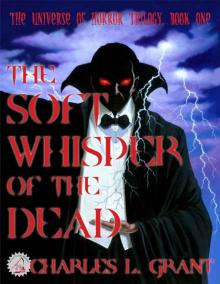 The Universe of Horror Volume 1: The Soft Whisper of the Dead (Neccon Classic Horror)
The Universe of Horror Volume 1: The Soft Whisper of the Dead (Neccon Classic Horror)![[Oxrun Station] Dialing The Wind Read online](http://i1.bookreadfree.com/i/03/19/oxrun_station_dialing_the_wind_preview.jpg) [Oxrun Station] Dialing The Wind
[Oxrun Station] Dialing The Wind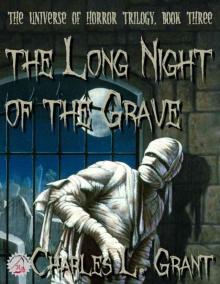 The Universe of Horror Volume 3: The Long Night of the Grave (Neccon Classic Horror)
The Universe of Horror Volume 3: The Long Night of the Grave (Neccon Classic Horror)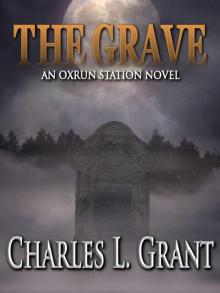 The Grave - An Oxrun Station Novel (Oxrun Station Novels)
The Grave - An Oxrun Station Novel (Oxrun Station Novels)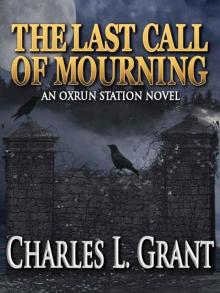 The Last Call of Mourning - An Oxrun Station Novel (Oxrun Station Novels)
The Last Call of Mourning - An Oxrun Station Novel (Oxrun Station Novels)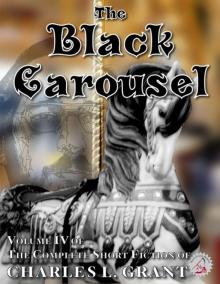 The Complete Short Fiction of Charles L. Grant, Volume IV: The Black Carousel
The Complete Short Fiction of Charles L. Grant, Volume IV: The Black Carousel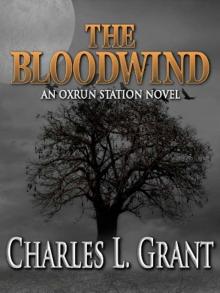 The Bloodwind - An Oxrun Station Novel (Oxrun Station Novels)
The Bloodwind - An Oxrun Station Novel (Oxrun Station Novels)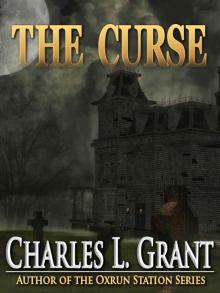 The Curse
The Curse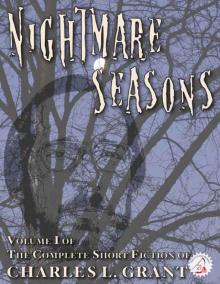 The Complete Short Fiction of Charles L. Grant Volume 1: Nightmare Seasons (Necon Classic Horror)
The Complete Short Fiction of Charles L. Grant Volume 1: Nightmare Seasons (Necon Classic Horror)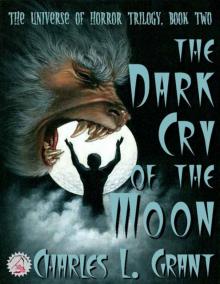 The Universe of Horror Volume 2: The Dark Cry of the Moon (Neccon Classic Horror)
The Universe of Horror Volume 2: The Dark Cry of the Moon (Neccon Classic Horror)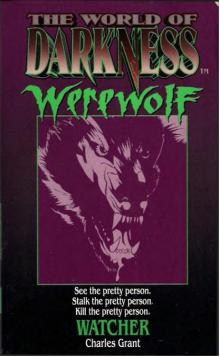 Watcher: Based on the Apocalypse (World of Darkness : Werewolf)
Watcher: Based on the Apocalypse (World of Darkness : Werewolf)![[Oxrun Station] The Bloodwind Read online](http://i1.bookreadfree.com/i/03/25/oxrun_station_the_bloodwind_preview.jpg) [Oxrun Station] The Bloodwind
[Oxrun Station] The Bloodwind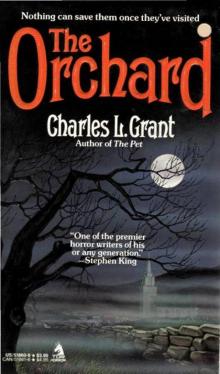 The Orchard
The Orchard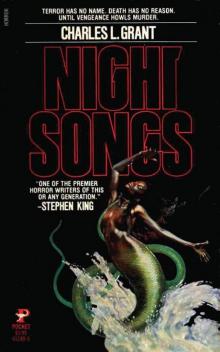 Night Songs
Night Songs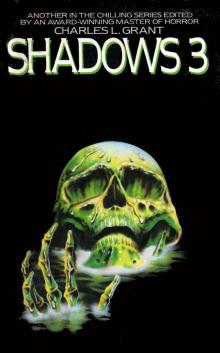 Shadows 3
Shadows 3![Symphony - [Millennium Quartet 01] Read online](http://i1.bookreadfree.com/i1/04/02/symphony_-_millennium_quartet_01_preview.jpg) Symphony - [Millennium Quartet 01]
Symphony - [Millennium Quartet 01] The Hour of the Oxrun Dead (Necon Classic Horror)
The Hour of the Oxrun Dead (Necon Classic Horror)![In the Mood - [Millennium Quartet 02] Read online](http://i1.bookreadfree.com/i1/03/31/in_the_mood_-_millennium_quartet_02_preview.jpg) In the Mood - [Millennium Quartet 02]
In the Mood - [Millennium Quartet 02]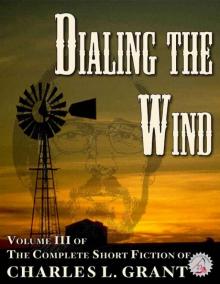 The Complete Short Fiction of Charles L. Grant Volume 3: Dialing the Wind (Neccon Classic Horror)
The Complete Short Fiction of Charles L. Grant Volume 3: Dialing the Wind (Neccon Classic Horror)![[Oxrun Station] The Last Call of Mourning Read online](http://i1.bookreadfree.com/i2/04/05/oxrun_station_the_last_call_of_mourning_preview.jpg) [Oxrun Station] The Last Call of Mourning
[Oxrun Station] The Last Call of Mourning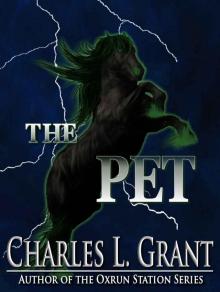 The Pet
The Pet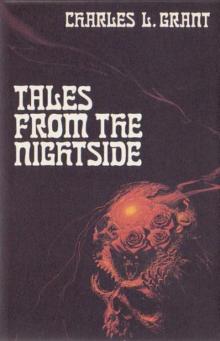 Tales from the Nightside
Tales from the Nightside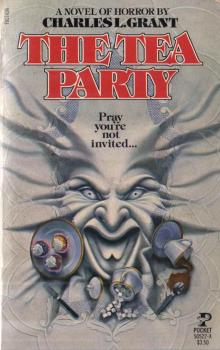 The Tea Party - A Novel of Horror
The Tea Party - A Novel of Horror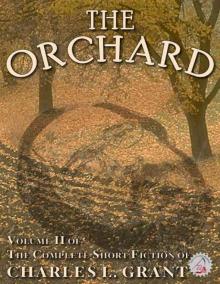 The Complete Short Fiction of Charles L. Grant Volume 2: The Orchard (Necon Classic Horror)
The Complete Short Fiction of Charles L. Grant Volume 2: The Orchard (Necon Classic Horror) Whirlwind
Whirlwind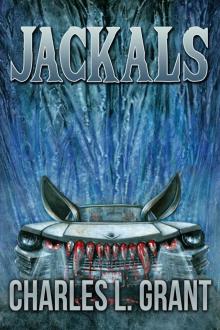 Jackals
Jackals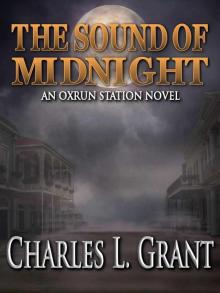 The Sound of Midnight - An Oxrun Station Novel
The Sound of Midnight - An Oxrun Station Novel